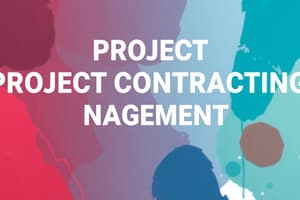Podcast
Questions and Answers
What is project management?
What is project management?
Project management is the application of knowledge, skills, tools, and techniques to project activities involving the organization of resources to complete a scope of work within constraints of cost and time.
Who are typically referred to as contractors in construction?
Who are typically referred to as contractors in construction?
Contractors or constructors are builders who supervise the execution of construction projects.
What are the primary roles of specialty contractors?
What are the primary roles of specialty contractors?
- Coordinate project tasks
- Supervise overall project execution
- Perform work in their specialties (correct)
- Supply materials and equipment
What is a Gantt chart?
What is a Gantt chart?
Gantt charts are primarily useful for advanced project planning.
Gantt charts are primarily useful for advanced project planning.
What do PERT and CPM stand for?
What do PERT and CPM stand for?
What is one of the advantages of using PERT/CPM?
What is one of the advantages of using PERT/CPM?
How does PERT/CPM assist with change orders during a construction project?
How does PERT/CPM assist with change orders during a construction project?
What is project management defined as?
What is project management defined as?
Which of the following roles do construction contractors primarily play in a project?
Which of the following roles do construction contractors primarily play in a project?
Who developed the Gantt chart?
Who developed the Gantt chart?
Gantt charts are only useful for final project planning.
Gantt charts are only useful for final project planning.
What do PERT and CPM stand for?
What do PERT and CPM stand for?
What advantage does PERT/CPM provide in project management?
What advantage does PERT/CPM provide in project management?
The advantage of using Gantt charts is its __________.
The advantage of using Gantt charts is its __________.
Flashcards are hidden until you start studying
Study Notes
Project Management Defined
- Project management involves applying knowledge, skills, tools, and techniques to meet project requirements.
- Resources managed include manpower, machinery, materials, and finances.
- Projects aim to fulfill specified scopes within constraints of cost and time while managing associated risks.
- Success is defined by achieving both quantitative and qualitative objectives.
Construction Contractors
- Contractors, also called constructors, supervise construction project execution.
- General contractors oversee overall coordination; specialty contractors focus on specific trades, e.g., mechanical or electrical work.
- Material and equipment suppliers often serve as installation contractors, vital for project quality, cost, and completion timeliness.
Tools and Techniques of Management: Gantt Charts
- Gantt charts, created by Henry Gantt, are horizontal bar charts used to plan and schedule projects.
- Known for simplicity, they are widely used for initial planning, transitioning to PERT and CPM for deeper analysis.
- They facilitate project timeline creation; interactive online versions allow task adjustments and linking dependent tasks.
Tools and Techniques of Management: PERT and CPM
- PERT (Program Evaluation and Review Technique) and CPM (Critical Path Method) are control tools utilized in construction management.
- These techniques help define project components and structure them in a network, highlighting operations critical to project completion.
- PERT/CPM aids in expediting projects while managing costs effectively, minimizing unnecessary overtime expenses.
Benefits of PERT/CPM
- Provides time leeway or "float" for non-critical operations, allowing project managers flexibility in planning.
- Establishes scheduling boundaries with options for reallocating resources to meet deadlines.
- Indicates earliest starting dates for tasks and subcontractor material supply, optimizing overall project scheduling.
- Aids in analyzing time and cost implications when adjusting methods, equipment, or crew.
Impact of Change Orders
- PERT/CPM facilitates re-scheduling in response to change orders while limiting cost increases.
- Revised critical path schedules help clarify payment claims and agreements between owners and contractors regarding contract extensions.
Project Management Defined
- Project management involves applying knowledge, skills, tools, and techniques to meet project requirements.
- Resources managed include manpower, machinery, materials, and finances.
- Projects aim to fulfill specified scopes within constraints of cost and time while managing associated risks.
- Success is defined by achieving both quantitative and qualitative objectives.
Construction Contractors
- Contractors, also called constructors, supervise construction project execution.
- General contractors oversee overall coordination; specialty contractors focus on specific trades, e.g., mechanical or electrical work.
- Material and equipment suppliers often serve as installation contractors, vital for project quality, cost, and completion timeliness.
Tools and Techniques of Management: Gantt Charts
- Gantt charts, created by Henry Gantt, are horizontal bar charts used to plan and schedule projects.
- Known for simplicity, they are widely used for initial planning, transitioning to PERT and CPM for deeper analysis.
- They facilitate project timeline creation; interactive online versions allow task adjustments and linking dependent tasks.
Tools and Techniques of Management: PERT and CPM
- PERT (Program Evaluation and Review Technique) and CPM (Critical Path Method) are control tools utilized in construction management.
- These techniques help define project components and structure them in a network, highlighting operations critical to project completion.
- PERT/CPM aids in expediting projects while managing costs effectively, minimizing unnecessary overtime expenses.
Benefits of PERT/CPM
- Provides time leeway or "float" for non-critical operations, allowing project managers flexibility in planning.
- Establishes scheduling boundaries with options for reallocating resources to meet deadlines.
- Indicates earliest starting dates for tasks and subcontractor material supply, optimizing overall project scheduling.
- Aids in analyzing time and cost implications when adjusting methods, equipment, or crew.
Impact of Change Orders
- PERT/CPM facilitates re-scheduling in response to change orders while limiting cost increases.
- Revised critical path schedules help clarify payment claims and agreements between owners and contractors regarding contract extensions.
Studying That Suits You
Use AI to generate personalized quizzes and flashcards to suit your learning preferences.




